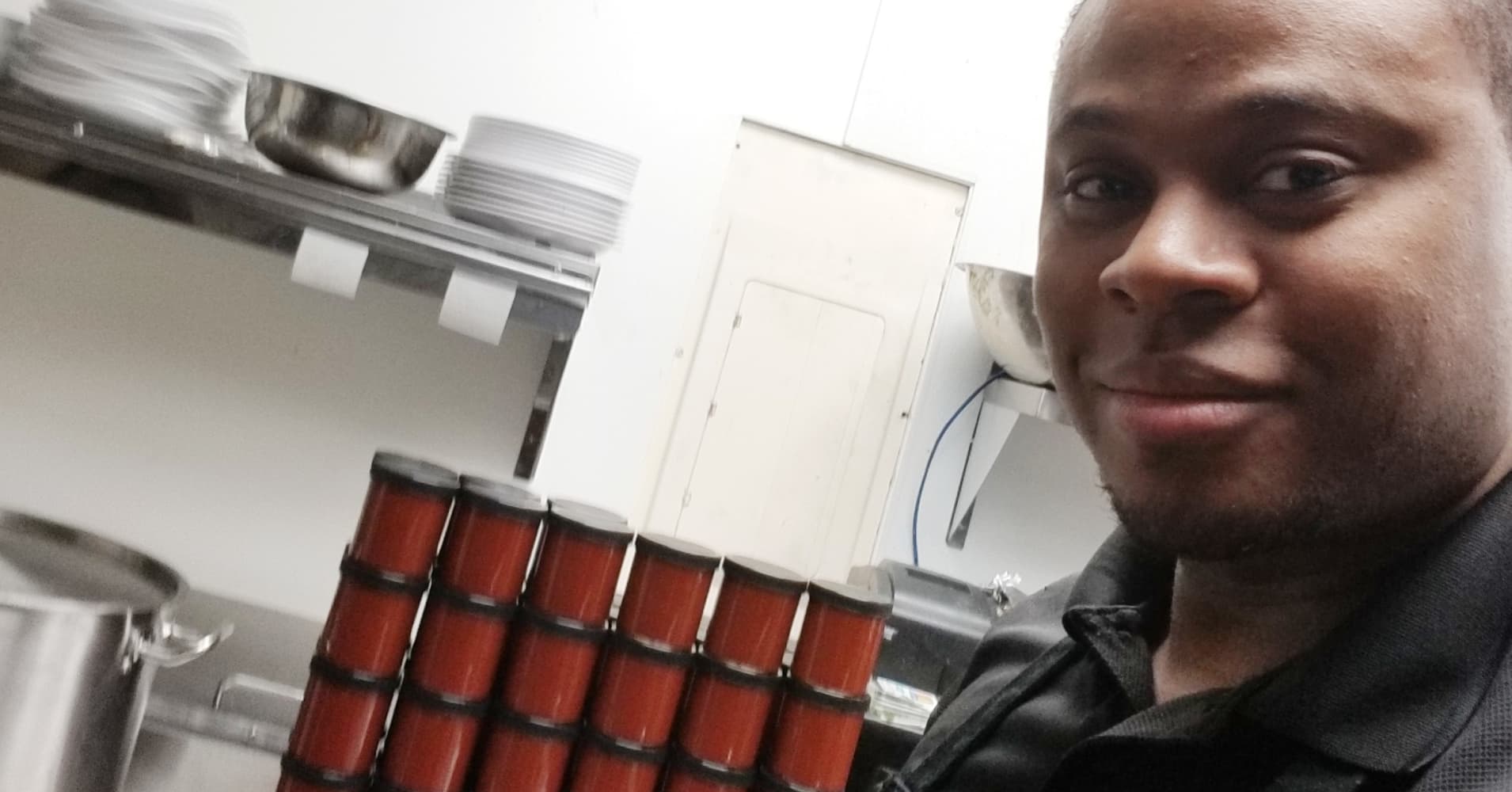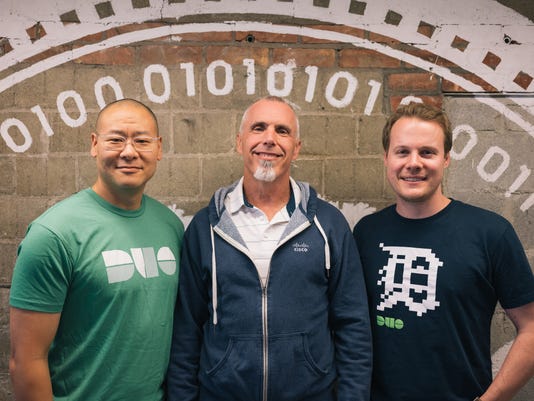Amazon security guard launched his own barbecue sauce business on Amazon

Seattle WA June 6 2018 Spencer Lindsay spends three days a week, working 12-hour shifts as a security guard at Amazon’s massive headquarters in Seattle, Washington.
For almost five years, he’s worked there. But when he isn’t on Amazon’s campus as a guard, Lindsay is running a business of his own: selling barbecue sauce via Amazon’s marketplace.
“Jeff [Bezos] started his company out of a garage in Bellevue, [Washington],” Lindsay tells CNBC Make It of Amazon’s founder and CEO. “That led into being the largest online store in the world, and at the same time changed the world.”
So if Bezos could do it with books, Lindsay thought, he could try it with sauce.
Lindsay’s brand is called Mr. Maurs (a mix of his middle name Maurice and the planet Mars, since Lindsay says his flavors are “out of this world”). There are eight types of sauce for $9.99 on Amazon: mild barbecue, original barbecue, hot barbecue, fire barbecue, chipotle, teriyaki, buffalo and pizza sauce.
Since first launching the products in 2016, Lindsay has sold over $15,000 worth of his sauces through Amazon, a local retail chain called Bartell Drugs and a contract with a Washington restaurant called Groovey Bites that uses his sauce on its dishes.
And even Jeff Bezos likes the sauce. “OK. Definitely want to buy a bottle of this…” Bezos tweeted before trying it.
“I had this unreal, ‘I can’t believe this feeling,” Lindsay says of learning Bezos bought a bottle. “For little ole’ me to have created something to have Mr. Amazon, the man himself, give recognition. Things like this don’t happen. I’m just beyond blessed and humbled.” (Amazon declined to comment.)
Barbecue “was just in my DNA,” says Lindsay, 33. He grew up watching his dad, who was a chef at a restaurant near their Riverside California home, barbecue for the family every Sunday. “That was his thing,” Lindsay explains.
Perfecting his own recipe took almost eight months of trial and error. “It was just me sitting down doing security work, and in my down times thinking of recipes,” Lindsay explains. “I’d write down like 15 different ingredients, and I’d go home, wake up, and the next morning I would just try it out.
“Certain ingredients I don’t even like,” he laughs. “Like horseradish? Horseradish on its own I think is borderline disgusting, but for some reason I was thinking, ‘Horseradish would be good in barbecue sauce.'”
Horseradish made it in as an ingredient, along with everything from tomato paste and brown sugar to hoisin and raisins, Lindsay says. It creates a sauce he describes as “a blend of smoky, sweet and a level of spicey to your desire.”
At first, Lindsay just started to bring the sauce to work to spice up his own lunch.
“I brought in a little 2- or 3-ounce Tupperware container,” Lindsay says. As co-workers began to ask for a taste, “the word was going around that I make good barbecue sauce,” he laughs.
In the summer of 2014, someone suggested that he bring it to a potluck for security personnel at Amazon.
“I had a 5-pound bowl of chicken wings,” Lindsay remembers, and he sauced them with his signature barbecue recipe. “Within 10 minutes of that pot luck, the whole bowl was gone.”
“People started dipping their fingers into the empty bowl to taste the barbecue sauce,” he adds.
After the potluck, co-workers offered to pay Lindsay $10 for a plate if he would make the barbecue wings for their lunches: “Five different people gave me $10,” he says.
For Lindsay, who works for Amazon subcontractor Security Industry Specialists and has been in the industry since 2005, it was enough encouragement to launch Mr. Maurs. He’s always dreamed of starting his own business.
“I told myself that I did not want to forever work for the man, I want to be the man,” he says. He also hopes that taking the risk to launch his business will teach his daughter Adrianna, 6, to dream big.
While the idea of a business percolated, Lindsay looked around the Amazon campus and realized he was at the epicenter of e-commerce. “I might as well utilize my resources,” he says. “That’s when things started happening.”
After finalizing his recipes in the kitchen of a friend’s Peruvian restaurant (and ditching a few flavor flops — his idea for a honey mustard sauce turned out terribly, he laughs), Lindsay had a product he was ready to sell.
He learned from Googling and watching YouTube how to start a business and filed the necessary paperwork with the city and state himself.
He had a friend with a graphic design background mock up labels from a hand-drawn sketch and tracked down a supplier for jars and packaging in southern Seattle. Any chance he could, Lindsay opted for local suppliers that he could visit quickly if there was a problem (“Time is money,” he says) and looked for ways he could buy in bulk (“It’s super cheap”).
In all, the start-up costs for the business totaled about $5,000. Lindsay paid for it by cashing out his saved up paid time off, working overtime hours and selling his four-door Lincoln sedan in exchange for an SUV so he could haul around jars of sauce. He also shrunk his spending.
“There was no extra stuff like going out on dates,” he says. “All those things I just had to cut out. I made sacrifices.”
When he was ready to put his Mr. Maurs out into the world, “At first, I had no idea how I was going to get on Amazon.com,” Lindsay remembers. So, he started asking questions around the office at Amazon. “I started going to certain receptionists that I’m pretty good with here on campus, and they have a lot of insights.”
They helped him find the criteria his product would need to meet, set forth by Amazon, in order to sell on the site’s marketplace, where third party sellers are listed along with Amazon’s own products. He began ticking off items like food safety credentials, a business license and insurance.
In September 2016, Lindsay sold his first sauce on Amazon, but he admits it was to a co-worker. “And I still work with her today,” he adds with a laugh. After that, it began to take off, the Seattle Times reported in 2017.
That’s when Bezos, the richest man in the world, bought a bottle.
A few months ago, Lindsay expanded his sauce production to an industrial kitchen. His products are sent to customers with Fulfillment By Amazon, a service where Amazon handles everything beyond production, like packing and shipping, which he opted to pay for because of consumer’s expectation for two-day shipping. The bulk of his sales come through Amazon, he says.
He’s even brought on another employee for the first time, to help him sell sauce and chicken wings at farmers markets being held over the summer at Amazon’s campus.
But Amazon hasn’t just helped Lindsay sell his sauce — it’s inspired him as a business owner and boss. While working on campus, Lindsay picked up a few things he hopes to implement as Mr. Maurs grows.
“Amazon has hundreds of different departments, and every department has a boss in that department, and they take ownership,” he explains. “I’m looking at that and I’m like, ‘Man, I want that for my employees.’ I want people to want to come to work.”
For his next project, Lindsay says he plans to open his own chicken-wing restaurant near Amazon’s headquarters, featuring all of his signature flavors.
“I started here,” he says. And with more than 45,000 Amazon employees in Seattle, Lindsay argues there are plenty of customers to reach: “If I am just Amazon-Seattle-campus successful, to me, that is successful enough.”



